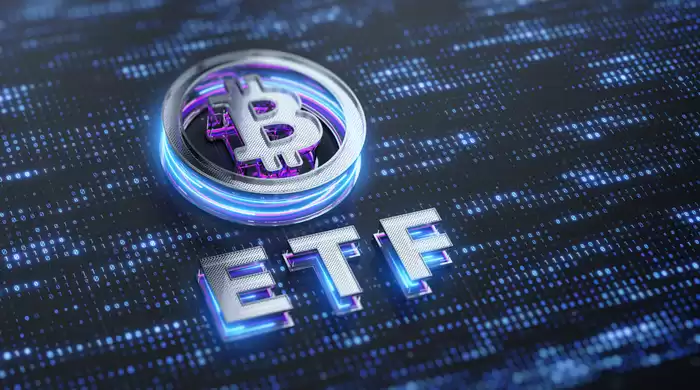-
 bitcoin
bitcoin $87959.907984 USD
1.34% -
 ethereum
ethereum $2920.497338 USD
3.04% -
 tether
tether $0.999775 USD
0.00% -
 xrp
xrp $2.237324 USD
8.12% -
 bnb
bnb $860.243768 USD
0.90% -
 solana
solana $138.089498 USD
5.43% -
 usd-coin
usd-coin $0.999807 USD
0.01% -
 tron
tron $0.272801 USD
-1.53% -
 dogecoin
dogecoin $0.150904 USD
2.96% -
 cardano
cardano $0.421635 USD
1.97% -
 hyperliquid
hyperliquid $32.152445 USD
2.23% -
 bitcoin-cash
bitcoin-cash $533.301069 USD
-1.94% -
 chainlink
chainlink $12.953417 USD
2.68% -
 unus-sed-leo
unus-sed-leo $9.535951 USD
0.73% -
 zcash
zcash $521.483386 USD
-2.87%
What is the risk level of a Bitcoin ETF?
Investing in a Bitcoin ETF carries a high risk level due to the cryptocurrency's volatility, regulatory uncertainties, and potential market manipulation.
Oct 16, 2024 at 11:00 pm

Bitcoin exchange-traded funds (ETFs) are investment vehicles that track the price of Bitcoin, allowing investors to gain exposure to the cryptocurrency without directly owning it.
2. Risk FactorsInvesting in a Bitcoin ETF involves the following risks:
- Volatility: Bitcoin's price can fluctuate significantly over short periods, leading to potential losses.
- Regulatory Uncertainty: The regulatory landscape for cryptocurrencies, including Bitcoin, is constantly evolving, adding uncertainty to the investment environment.
- Counterparty Risk: The value of a Bitcoin ETF is dependent on the custodians and exchanges that hold the underlying Bitcoin.
- Market Manipulation: Bitcoin has historically been susceptible to market manipulation, which can impact ETF prices.
- Performance Risk: Bitcoin ETFs may underperform compared to the underlying Bitcoin due to fees and tracking errors.
The risk level of a Bitcoin ETF can vary based on factors such as:
- Strategy: Active or passive management, as well as the use of leverage
- Fund Expense Ratio: Higher fees can reduce returns
- Trading Liquidity: ETFs with low trading volume may be more susceptible to price manipulation
The risk level of a Bitcoin ETF is generally considered high due to the inherent volatility and regulatory uncertainties associated with Bitcoin. Investors should carefully consider their risk tolerance and conduct thorough research before investing in a Bitcoin ETF.
Disclaimer:info@kdj.com
The information provided is not trading advice. kdj.com does not assume any responsibility for any investments made based on the information provided in this article. Cryptocurrencies are highly volatile and it is highly recommended that you invest with caution after thorough research!
If you believe that the content used on this website infringes your copyright, please contact us immediately (info@kdj.com) and we will delete it promptly.
- Coinbase and Crypto ISAC Forge Alliance, Setting New Standards for Security Intelligence in the Digital Asset World
- 2026-01-31 04:35:01
- US Mint Honors Revolutionary War Hero Polly Cooper on 2026 Sacagawea Coin
- 2026-01-31 03:55:01
- Bitcoin Hits $83K Amidst Risk-Off Selling Frenzy, ETFs See Major Outflows
- 2026-01-31 04:35:01
- New 2026 Dollar Coin Shines a Light on Oneida Heroine Polly Cooper and America's First Allies
- 2026-01-31 04:15:01
- Polly Cooper, Oneida Woman, Honored on 2026 U.S. $1 Coin for Revolutionary War Heroism
- 2026-01-31 04:25:01
- Oneida Heroine Polly Cooper Immortalized on New $1 Coin: A Long-Overdue Tribute to Revolutionary Generosity
- 2026-01-31 04:25:01
Related knowledge

How to get started with Bitcoin ETF investing with just $100?
Jan 22,2026 at 08:59pm
Understanding Bitcoin ETF Basics1. A Bitcoin ETF is a financial instrument traded on stock exchanges that tracks the price of Bitcoin without requirin...

What is the minimum amount you need to invest in a Bitcoin ETF?
Jan 18,2026 at 08:20am
Bitcoin ETF Investment Thresholds1. Bitcoin ETFs trade on traditional stock exchanges, meaning investors purchase shares just like any other publicly ...

How do I protect my Bitcoin ETF from market volatility?
Jan 18,2026 at 12:20pm
Understanding Bitcoin ETF Structure1. Bitcoin ETFs hold bitcoin or bitcoin futures contracts rather than the underlying asset directly, introducing st...

How to transfer your GBTC shares to a lower-cost Bitcoin ETF?
Jan 23,2026 at 04:20am
Understanding GBTC Share Conversion Mechanics1. Grayscale Bitcoin Trust (GBTC) operates as a closed-end fund, meaning its shares trade on the open mar...

What is the best time of day to buy or sell a Bitcoin ETF?
Jan 20,2026 at 02:39am
Market Hours and Liquidity Patterns1. Bitcoin ETFs trade on traditional stock exchanges like the NYSE and Nasdaq, which operate during standard U.S. m...

How to buy the ARK 21Shares Bitcoin ETF (ARKB)?
Jan 25,2026 at 10:39pm
Understanding ARKB Structure and Availability1. ARKB is a spot Bitcoin exchange-traded fund launched by ARK Invest and 21Shares in the United States. ...

How to get started with Bitcoin ETF investing with just $100?
Jan 22,2026 at 08:59pm
Understanding Bitcoin ETF Basics1. A Bitcoin ETF is a financial instrument traded on stock exchanges that tracks the price of Bitcoin without requirin...

What is the minimum amount you need to invest in a Bitcoin ETF?
Jan 18,2026 at 08:20am
Bitcoin ETF Investment Thresholds1. Bitcoin ETFs trade on traditional stock exchanges, meaning investors purchase shares just like any other publicly ...

How do I protect my Bitcoin ETF from market volatility?
Jan 18,2026 at 12:20pm
Understanding Bitcoin ETF Structure1. Bitcoin ETFs hold bitcoin or bitcoin futures contracts rather than the underlying asset directly, introducing st...

How to transfer your GBTC shares to a lower-cost Bitcoin ETF?
Jan 23,2026 at 04:20am
Understanding GBTC Share Conversion Mechanics1. Grayscale Bitcoin Trust (GBTC) operates as a closed-end fund, meaning its shares trade on the open mar...

What is the best time of day to buy or sell a Bitcoin ETF?
Jan 20,2026 at 02:39am
Market Hours and Liquidity Patterns1. Bitcoin ETFs trade on traditional stock exchanges like the NYSE and Nasdaq, which operate during standard U.S. m...

How to buy the ARK 21Shares Bitcoin ETF (ARKB)?
Jan 25,2026 at 10:39pm
Understanding ARKB Structure and Availability1. ARKB is a spot Bitcoin exchange-traded fund launched by ARK Invest and 21Shares in the United States. ...
See all articles










































































